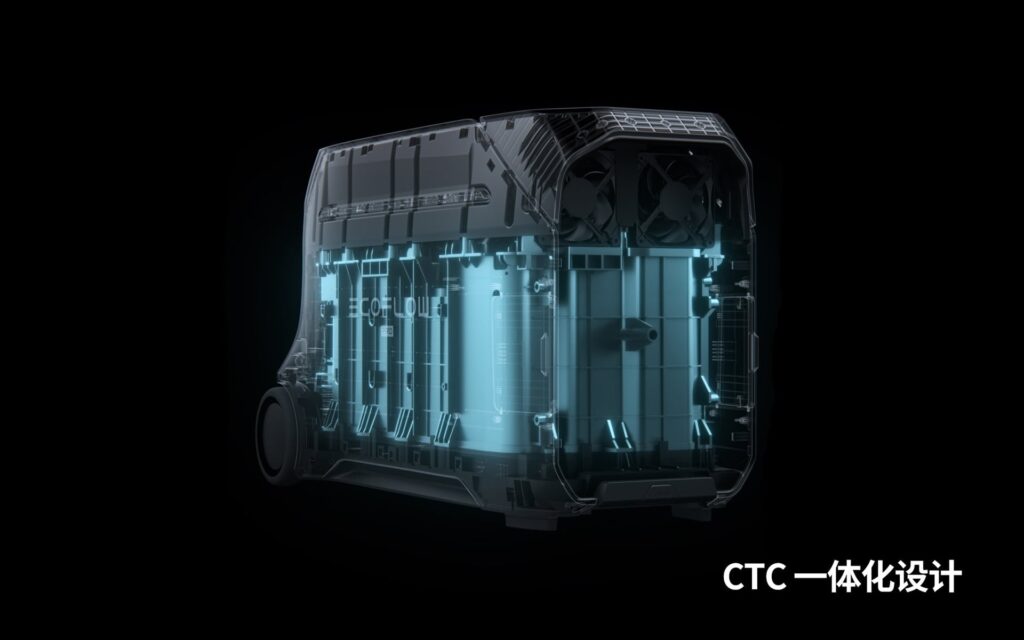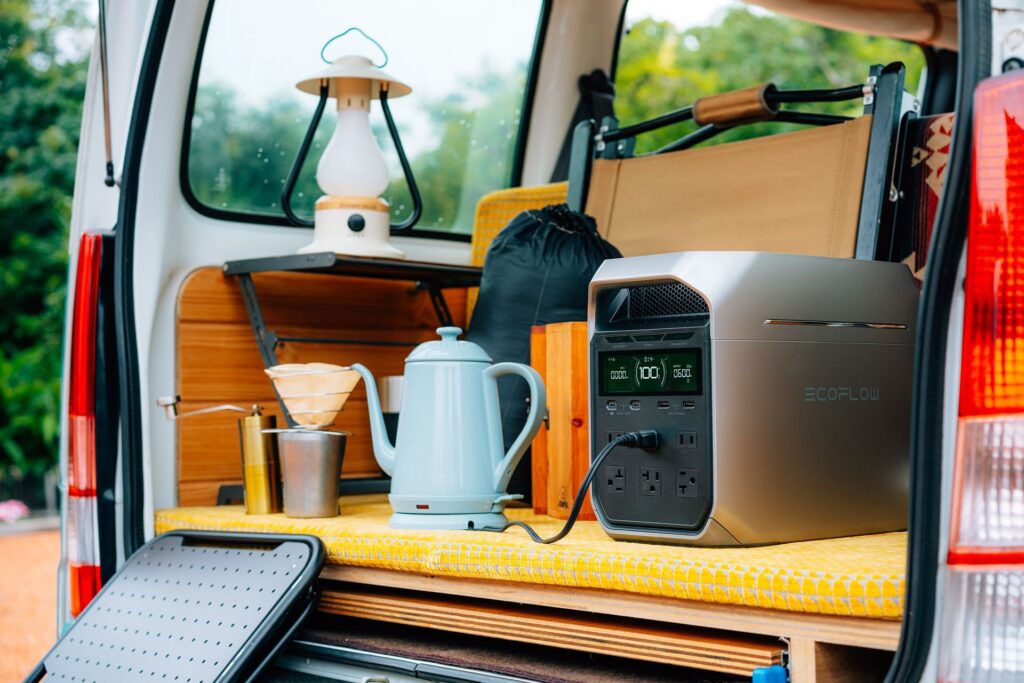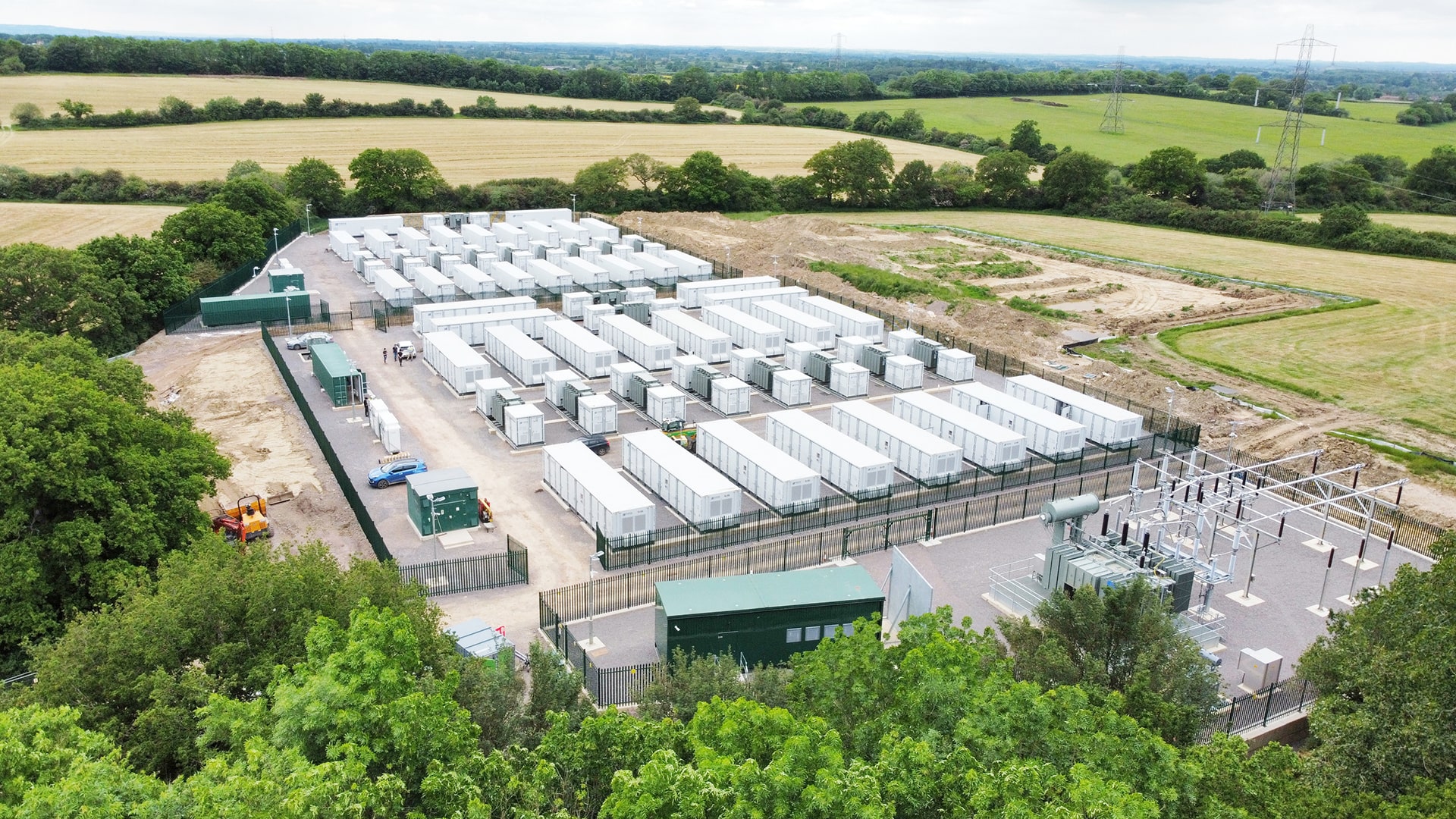On September 6, Typhoon Yagi made landfall along the coast of Wenchang, Hainan.
Official data shows that this was the strongest typhoon to make landfall in China this year, resulting in trees being uprooted, severe flooding in some areas, significant disruptions to road traffic, and power system failures. Large-scale power and communication outages occurred, severely affecting residents’ daily lives.
In response to such extreme conditions, emergency power supplies have become crucial to keep cities running.
At several disaster relief sites in Wenchang, temporary emergency power stations were set up, providing power for essential equipment on rescue sites. For instance, they powered chainsaws to clear roadblocks and extended the operational range of drones used by rescue teams, ensuring smooth rescue operations. In addition, emergency power sources were also used to meet basic electricity and communication needs for affected residents.
These emergency power products were provided by EcoFlow. In September, during a comprehensive emergency drill organized by Jiangsu’s Blue Sky Rescue Team, EcoFlow also provided key power support for emergency disaster relief, powering demolition tools, drone systems, communication systems, medical equipment, lighting systems, and life detection devices.

Emergency power is one of the more typical uses for mobile energy storage systems. This technology, also known as portable energy storage, has steadily evolved into a vital component of the broader energy storage market. Over the past few years, a surge in outdoor electricity needs—coupled with natural disasters and energy shortages—has driven anxieties that are pushing the mobile energy storage sector into rapid growth. What was once a niche industry has quickly expanded into a global market, even sparking a buying frenzy in Europe, where energy shortages have hit especially hard.
However, from 2023 onward, influenced by stabilized electricity prices and manufacturers destocking, market demand for mobile energy storage began to slow. For instance, global shipments of household energy storage fell by 2% in the second quarter of 2023 compared to the first quarter—the first decline since household energy storage data became available. These signs have raised external concerns about the future of mobile energy storage products.
Mobile energy storage offers a broad and ever-expanding range of applications. From emergency relief and balcony solar setups to outdoor camping, road trips, and home backup, its versatility is evident across a variety of use cases.
As consumers become more conscious of energy independence and industries face growing energy demands, mobile energy storage is poised to maintain strong, long-term market demand as an accessible solution for achieving energy autonomy.
EcoFlow is a major player in the mobile energy storage field. Established in 2017, EcoFlow sells products to over 120 countries and regions, reaching more than three million customers worldwide.
In September, EcoFlow unveiled its “X-Core Technology Platform 3.0,” a clean energy solution designed to enhance performance, safety, and intelligence. This marked a significant moment for the industry, emphasizing the need for ongoing innovation in these three core areas of mobile energy storage. The platform introduces a new approach for the energy storage sector, focused on improving product experience and safety through continuous technological advancements. Alongside this launch, EcoFlow introduced four new mobile energy storage products: the Delta Pro 3, the Delta Pro 3 series, the River 3 series, and the “Rapid” magnetic power bank.
EcoFlow sees mobile energy storage as the most accessible way for the public to adopt renewable energy. The company aims to drive widespread clean energy adoption by continuously innovating its technology and products to offer a simpler, more flexible, and reliable power experience. Through this approach, EcoFlow hopes to accelerate the growth of clean energy usage, support stable industry development, and promote high standards for both product experience and safety.
Safety and reliability take center stage as energy storage products enter households
Whether powering tents and lighting during outdoor camping, charging appliances on road trips, or providing backup power during home outages, mobile energy storage products are quickly becoming essential for families and individuals. Their convenience and versatility have also led to adoption in various professional settings.
From a technical standpoint, these devices need to store substantial energy in compact designs, all while withstanding high temperatures, humidity, impacts, and other challenges. Safety is crucial—any failure, whether for personal or industrial users, could have serious consequences. As such, mobile energy storage products must adhere to strict safety standards.
The portable energy storage market has seen explosive growth in recent years, attracting a wave of new entrants. However, this surge has also created a mixed market landscape and raised concerns within the industry.
Specifically, the influx of low-quality, white-label energy storage products has heightened safety risks. Some companies have engaged in false advertising, provided subpar after-sales service, or initiated price wars, which have significantly disrupted market competition.
More concerning than price wars, however, are safety incidents involving energy storage devices, which could cause lasting damage to the industry’s reputation. Safety, therefore, is not just a basic requirement for mobile energy storage products—it is the foundation for the industry’s long-term growth.
At EcoFlow, product safety is a core pillar of its technical system. The X-Core platform places safety at the forefront of its design.
On the hardware side, the Delta Pro 3, built on the X-Core platform, features high-temperature-resistant materials and a UL-certified 5VA rating, which includes a 30-second self-extinguishing capability. This means that even in the event of a fire, the product can extinguish itself within 30 seconds, preventing flames from spreading.
Additionally, the Delta Pro 3 and its series include IP65-rated protective modules, ensuring industry-leading water resistance and safety standards. The IP65 rating is an international standard indicating that products are completely dust-tight and protected against water jets, making them ideal for outdoor use.
According to Adrian, an EcoFlow engineer, achieving an IP65 rating for a single module is relatively simple; the challenge lies in ensuring that all mass-produced modules consistently meet this standard. To address this, EcoFlow strictly monitors production processes, using intelligent screwdrivers to ensure screws meet torque and turn specifications. Every product undergoes air tightness testing before delivery to guarantee compliance.
Furthermore, products on the X-Core platform use automotive-grade lithium iron phosphate (LFP) batteries, which meet the highest UL9540 and UL9540A standards for long-term battery safety. The products also feature a cell-to-chassis (CTC) design that integrates the battery with the device’s internal frame. This not only strengthens the overall structure but also enhances impact resistance, ensuring reliable performance in various environments.

On the software side, EcoFlow utilizes algorithms for real-time safety monitoring and cloud data to predict potential risks. Since 2022, the company has implemented a cloud-based smart production management system, which uploads production data in real-time. If a product fails to meet safety standards, the system triggers an alert and halts its progress, ensuring every step in the production process meets strict safety requirements.
As the mobile energy storage market matures, the focus is shifting from price competition to long-term user experience and safety assurance. Safety is not only the baseline for mobile energy storage products but also the cornerstone of competitiveness and a critical factor in future market success.
Ultra-fast charging and usability: Meeting demands in mobile energy storage
Mobile energy storage products function as portable power banks, but with enhanced capabilities. In scenarios like outdoor camping, road trips, and emergency rescue, fast recharging becomes a critical need, making ultra-fast charging technology essential.

As the mobile energy storage field became more competitive, fast charging and high power emerged as standard industry features. However, EcoFlow was among the pioneers, investing in fast-charging technology early on.
EcoFlow was among the pioneers, investing in fast-charging technology early on. As early as 2019, it introduced X-Stream fast-charging technology, utilizing bidirectional inverter technology. At that time, charging mobile energy storage products took over ten hours, significantly hindering user experience and slowing product adoption.
With the development of fast-charging technology, EcoFlow reduced charging times dramatically—achieving 80% charge in one hour and a full charge in just 1.6 hours, with a maximum charging power of 1200 watts. This directly addressed user pain points, enabling EcoFlow to quickly capture market share.
With the latest upgrade to the X-Core platform, EcoFlow’s products now support ultra-fast charging up to 7200W using AC power. Whether through household outlets or electric vehicle charging stations, users can charge their devices at lightning speeds, drastically cutting down recharging time.
EcoFlow initially focused on fast charging via household power, but the latest products support a wider range of AC charging methods. This increased compatibility allows users to tackle power needs in more diverse scenarios, solving a wider array of power-related challenges.
Unlike conventional power banks, professional-grade mobile energy storage products must power multiple devices from a single charging unit. To overcome the limitations of rated capacity, EcoFlow developed the X-Boost power enhancement feature to improve usability.
Initially, X-Boost allowed lower-capacity units to support devices that exceeded their rated power, broadening the functionality of smaller units. Today, X-Boost’s capabilities have evolved significantly, particularly when it comes to powering high-demand appliances. The new Delta Pro 3, with upgraded X-Boost technology, can intelligently adjust voltage to power devices like central air conditioning units, water pumps, and demolition machines—further enhancing the product’s flexibility.
In its latest version of the X-Core platform, EcoFlow also introduced X-Quiet ultra-silent technology and X-GaNPower gallium nitride technology.
To reduce noise levels, EcoFlow optimized the internal structure of its devices, focusing on heat-generating components, and adopted a dual airflow system combined with thermal pipe technology. Precise temperature monitoring and intelligent cooling technologies ensure efficient cooling and quieter operation.
X-GaNPower, meanwhile, represents a significant leap in material science. EcoFlow’s new River 3 series incorporates gallium nitride (GaN) semiconductor material, replacing traditional silicon transistors. Gallium nitride offers lower conduction and switching losses, higher energy efficiency, and the ability to handle greater current density and higher working temperatures, allowing for more compact designs.
Tests show that the GaN-equipped River 3 is 30% smaller and can extend the operation of low-power appliances (below 100W) by up to 91%.
Video source: EcoFlow via 36Kr.
Of course, improving product performance requires more than just hardware. Without intelligent software integration, EcoFlow’s products would function like machines without lubrication—inefficient and prone to issues.
Beyond hardware, EcoFlow has actively developed software solutions, including EcoFlow Oasis, a system that connects mobile energy storage products, home energy storage systems, electric ecosystem products, and charging equipment. It also supports third-party hardware integration, offering true interconnectivity, flexible scheduling, and centralized control for users.
Energy storage is a critical component of renewable energy development and a key part of constructing modern power systems. As the energy storage market matures, a shift toward product quality is expected.
As an early innovator in the energy storage industry, EcoFlow continues to invest in product development, focusing on safety, performance, and intelligence. By enhancing product reliability and usability, EcoFlow aims to meet the increasingly diverse energy needs of its users.
In a fiercely competitive market, EcoFlow has charted an ambitious path—zeroing in on specific use cases while pushing the boundaries of what mobile energy storage can achieve. The company is intent on setting new benchmarks for the industry, driving innovation through technology, and steadily expanding its reach.
By focusing on bringing energy storage solutions into more homes and communities, EcoFlow isn’t just chasing market share—it’s advancing the idea of energy inclusivity, making reliable power accessible to more people across the globe.
KrASIA Connection features translated and adapted content that was originally published by 36Kr. This article was written by 36Kr Carbon.

